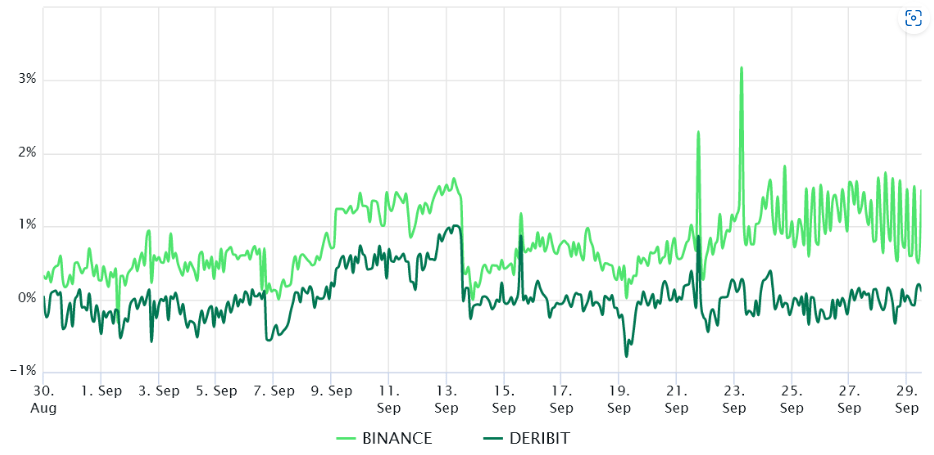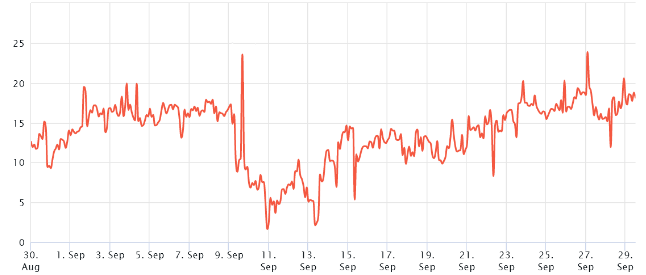It has been 111 days since Bitcoin (BTC) last closed above $25,000. In other words, the bears have taken the leading cryptocurrency under their control. Also, derivatives data shows that a reversal of this trend is unlikely.
Has Bitcoin reached bottom levels?
One hundred and eleven days have passed since Bitcoin (BTC) closed above $25,000. This has made some investors less confident that the asset has bottomed out, as we have also reported on Cryptokoin.com. Currently, global financial markets continue to be restless. Because after this week’s Nord Stream gas pipeline incident, tensions are rising in Ukraine. The Bank of England’s emergency response to government bond markets on September 28 also shed light on how fragile fund managers and financial institutions are right now. The move marked a sharp shift from the previous intention to tighten economies as inflationary pressures increase.

The S&P 500 is heading for the third consecutive negative quarter for the first time since 2009. Additionally, Bank of America analysts downgraded Apple to neutral due to the tech giant’s decision to cut iPhone production due to “weak consumer demand.” Finally, according to Fortune, the real estate market showed the first signs of rebound after housing prices fell in 77 percent of United States metropolitan areas. Is the deteriorating global economy having any impact on crypto investors? To understand this, let’s take a look at Bitcoin derivatives data.
Professional traders weren’t thrilled by the rally to $20,000
Retail investors often avoid quarterly futures due to price differentials from the spot markets. However, they are the tools preferred by professional traders. Because they prevent the fluctuation of funding rates that usually occurs in a perpetual futures contract. The quarterly forward annual premium should trade between 4 and 8 percent to cover the risks. This is the ratio that should be in healthy markets. The chart shows that derivatives traders have been bearish neutral for the past 30 days. It also shows that the Bitcoin futures premium remained below 2 percent for the entire time. More importantly, the metric has not recovered after BTC surged 21 percent between September 7 and 13, similar to the failed $20,000 resistance test on September 27.

The data mainly reflects the reluctance of professional traders to add leveraged long (bullish) positions. It is also necessary to analyze the Bitcoin options markets to exclude externalities specific to the futures instrument. For example, a 25 percent delta skew is a defining sign when market makers and arbitrage tables are overcharged for upside or downside protection. In bear markets, options traders give higher odds for the price breakout. This causes the skewed indicator to rise above 12 percent. On the other hand, bull markets tend to drop the curvature indicator below negative 12 percent. This means that drop put options are discounted.
Bitcoin price collapse expectation grows
The 30-day delta curvature has been above the 12 percent threshold since Sept. 21. This signals that options traders are less inclined to offer downside protection. As a comparison, between September 10 and 13, the associated risk was somewhat balanced relative to the buy and sell options that showed a neutral sentiment. Few futures liquidations confirm lack of surprise from investors
Futures and options metrics show that the September 27 Bitcoin price crash was more anticipated than expected. This explains the low impact on liquidations.

Despite the 9.2 percent correction from $20,300 to $18,500, only $22 million of futures contracts were forcibly liquidated. A similar price drop on Sept. 19 resulted in a total of $97 million in leverage futures liquidations. On the one hand, there is a positive attitude as the 111-day bear market is not enough to instill bearishness in Bitcoin investors, according to derivatives metrics. However, the futures premium is close to zero. If traders were sure of the price drop, the indicator would be backwards.







